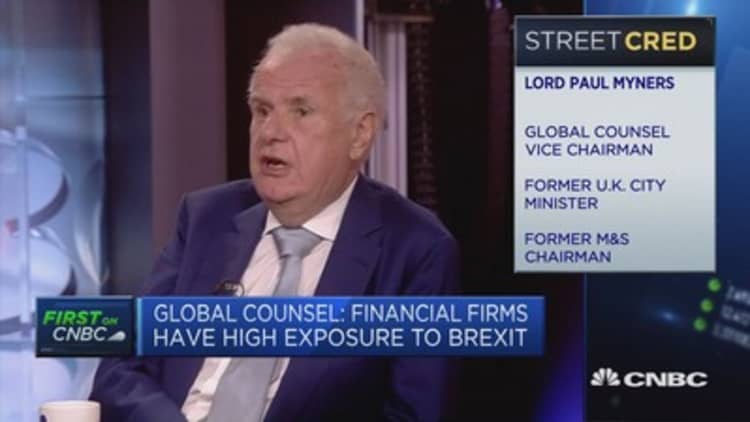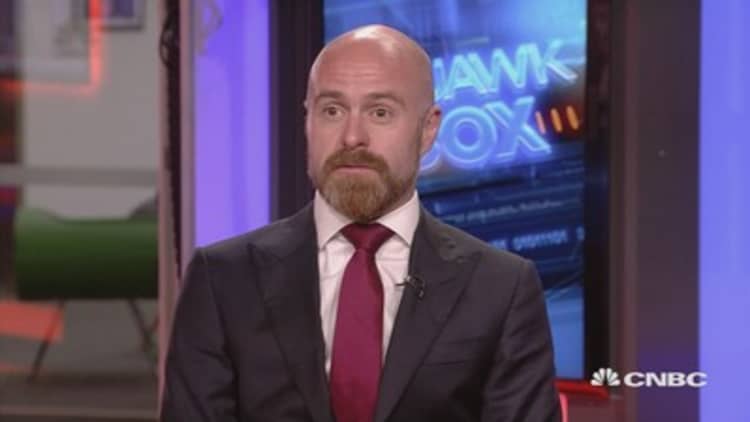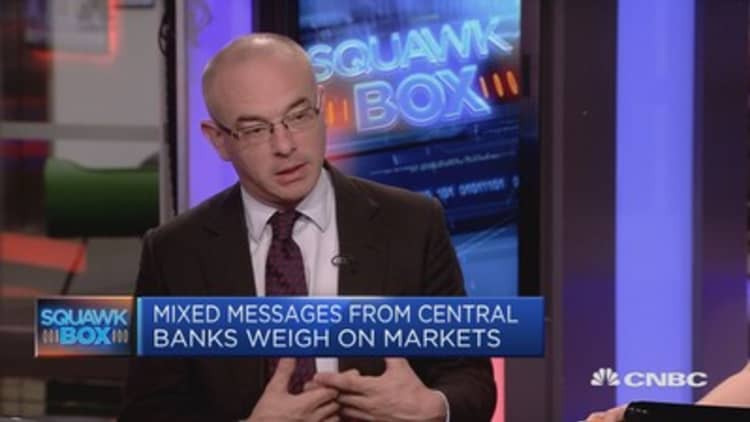We've entered the second half of the year and with it new rhetoric from central banks.
Since the crisis, the top 50 central banks in the world cut interest rates over 700 times, making an average of one interest rate cut every three trading days, Alex Dryden, global market strategist at JPMorgan Asset Management, told CNBC in an email Wednesday.
"After nearly a decade, growth is beginning to pick-up across all major regions. The synchronized upswing in international economies has seen global equities rally by 14.7 percent since October 2016. But with a healthier diagnosis for the global economy, central bankers are beginning to wean the patient off the ultra-loose monetary policy medicine," he added.
As talks on rate hikes beyond the U.S. emerge, CNBC takes a look at what the Bank of England, the European Central Bank and the Bank of Japan are likely to do this year.
Bank of England – 40% chance of a rate hike this year
Rising inflation is increasing pressure on the Bank of England (BoE) to tighten its policy despite elevated political concerns.
Kallum Pickering, senior U.K. economist at Berenberg, said in a note on Wednesday that "unless the BoE begins to tighten its monetary policy soon, (inflation) will overshoot its 2 percent inflation target even after the current, temporary sterling-driven inflation has passed."
Pickering points to a first rate hike of 25 basis points in the first quarter of next year but "with risks tilted toward a hike sooner."

"We see a 40 percent chance of a rate hike before this year is over. If the BoE hikes this year, it is more likely to happen at the November Inflation Report rather than the August Inflation Report," he added.
Analysts at Barclays also said that the chances of a rate hike in November have increased, but central bank officials will be heavily influenced by upcoming data releases.
"We still believe the cost of an early hiking mistake outweighs the cost of a late hike," the bank said in a note on Wednesday.
European Central Bank – tapering decision in the making
The European Central Bank (ECB) might have sent a few contradictory statements, but analysts are confident that monetary easing will be slowly reduced throughout 2018 with an announcement in the September or October meeting.
"We expect that the ECB Council will announce a tapering decision at its September meeting, or in October at the latest," Michael Schubert, senior economist at Commerzbank, told CNBC via email last week. He added that tapering is likely to start in January of next year and it will probably last a year, until December 2018.

Despite a consensus over an announcement on tapering, analysts seem divided on the timing of the first hike.
"We feel that the first deposit rate hike is further away than markets are currently pricing in. We have the first deposit rate hike penciled in for early 2019," Elwin de Groot, senior market economist at Rabobank, told CNBC last week. According to Reuters, 90 percent of currency traders expect a rate hike in the first half of next year.
Bank of Japan - too early to move
"The Bank of Japan is still pulling out all the stops to try to raise inflation," David Stubbs, global market strategist at JP Morgan Asset Management, told CNBC Wednesday.
"For now, despite very low unemployment and improved confidence, inflation remains well below their 2 percent target, suggesting that they need to continue to do what they can to push growth and inflation upward. The global deflationary environment, and the structural challenges that Japan faces with an aging population and high debt levels, suggests that it will likely be difficult for the Bank of Japan to hit its inflation target any time soon. It is therefore no surprise that market pricing suggests we will not see an end to the negative rate policy until at least 2020," he added.
Federal Reserve - one more US rate hike this year even if Ivanka Trump becomes the next chair
It's the first of the four major central banks tightening its policy as the U.S. economy has improved since the 2008 financial crisis. Analysts believe that there will be another rate hike before or in December, the third this year.

Paul Donovan, global economist at UBS Wealth Management, told CNBC on Monday: "The Fed is locking itself into a long-term strategy and then even if we get Ivanka Trump as head of the Fed next year, they've got a long-term quantitative policy exit strategy, which would be really difficult to overturn."
According to Nick Gartside, International CIO of Fixed Income at JP Morgan, the "Fed is smart to go now, as continued purchasing by the Bank of Japan and the European Central Bank cushions its actions."



